MICT710 Report: Ethical Decision-Making, ACS Code, Cyber Crime
VerifiedAdded on 2024/05/31
|12
|3266
|459
Report
AI Summary
This report provides an ethical analysis of decision-making in the IT culture, utilizing a five-step model. It explores the ACS Code of Ethics, highlighting its six core values, and discusses the importance of public interest in ethical considerations. The report also examines various ethical theories, including Utilitarianism, Deontology, and Character-based ethics (Virtues), within the context of cybercrime and professional IT conduct. It further addresses the impact of cybercrime, intellectual property rights, and privacy concerns, while emphasizing the need for robust ethical frameworks and awareness in the IT sector. Desklib provides access to this and many other solved assignments for students.
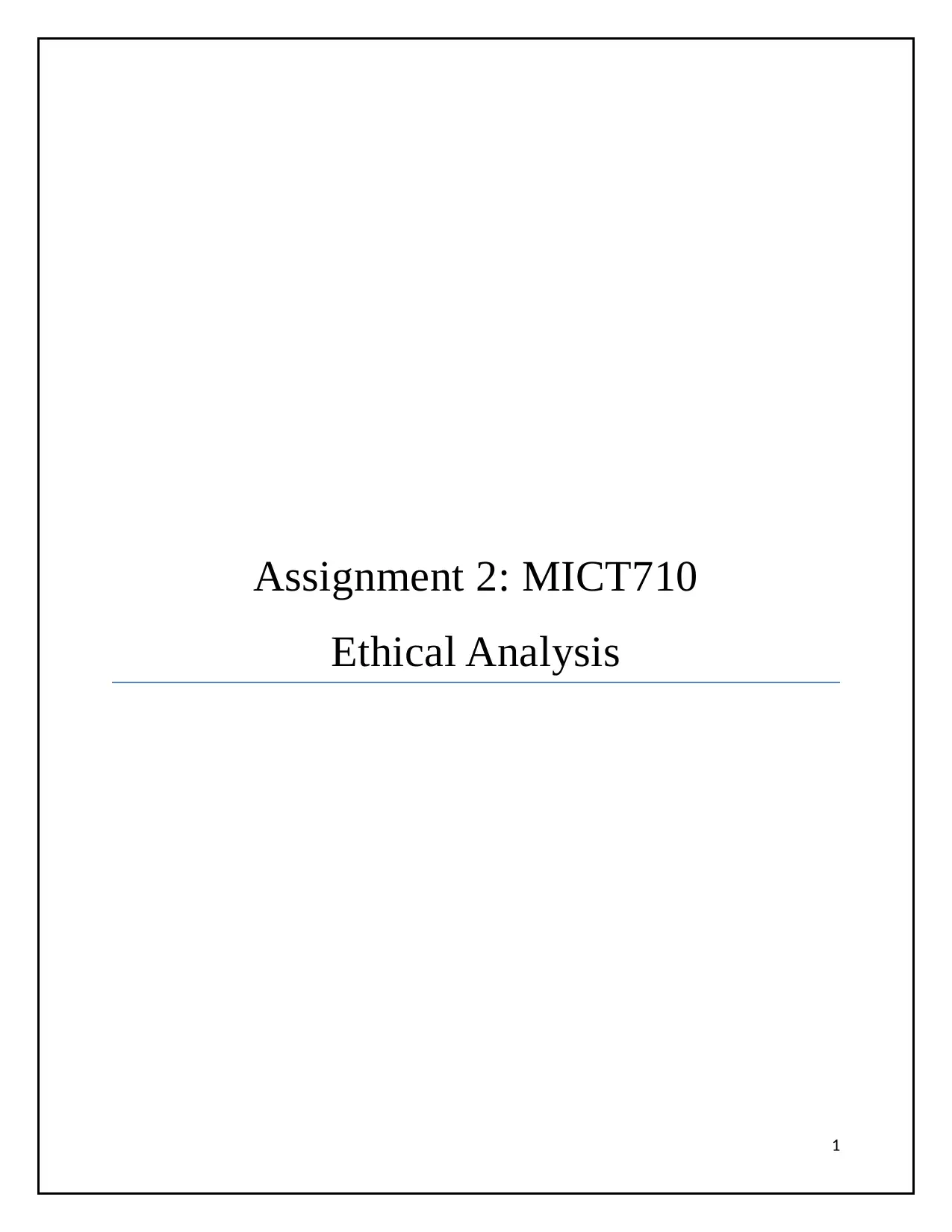
Assignment 2: MICT710
Ethical Analysis
1
Ethical Analysis
1
Paraphrase This Document
Need a fresh take? Get an instant paraphrase of this document with our AI Paraphraser
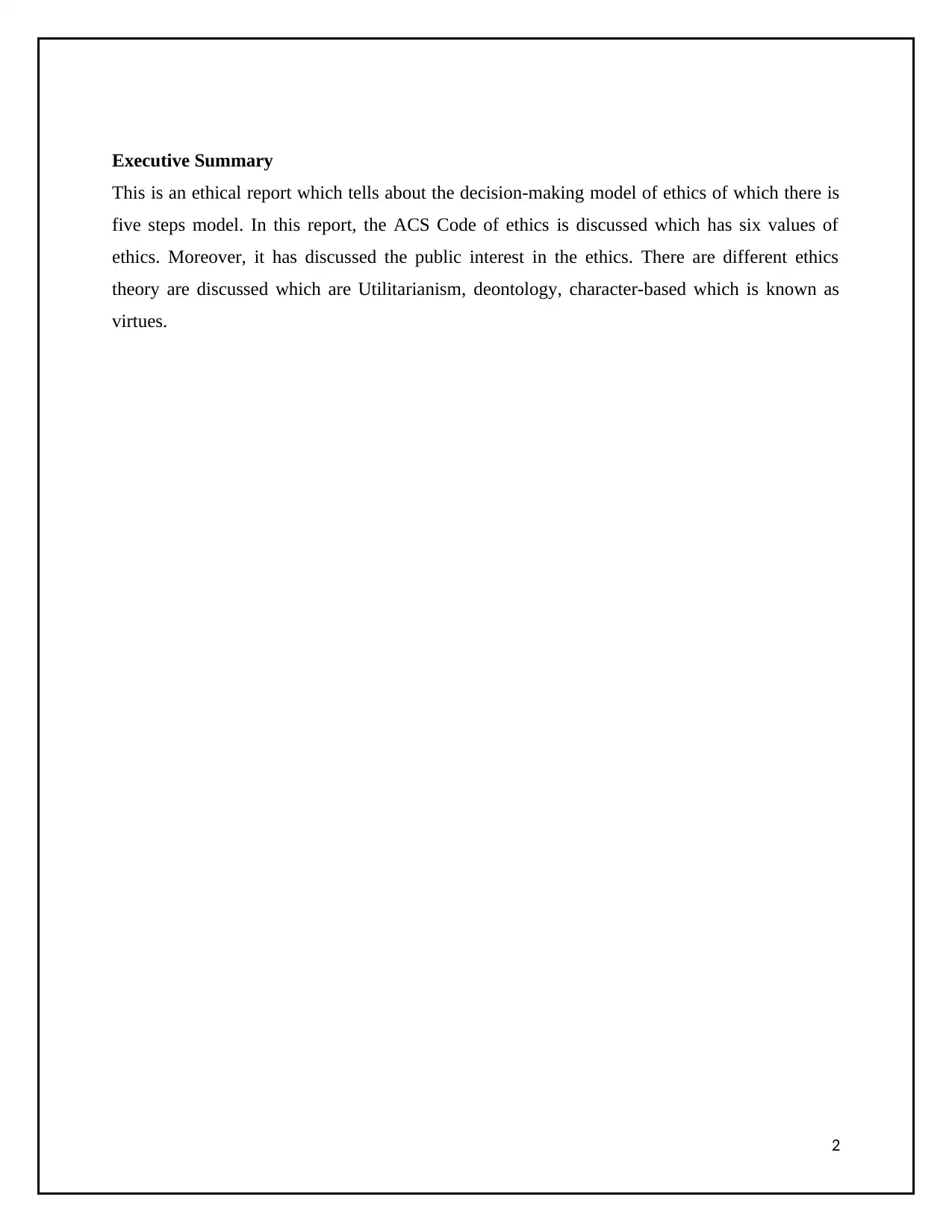
Executive Summary
This is an ethical report which tells about the decision-making model of ethics of which there is
five steps model. In this report, the ACS Code of ethics is discussed which has six values of
ethics. Moreover, it has discussed the public interest in the ethics. There are different ethics
theory are discussed which are Utilitarianism, deontology, character-based which is known as
virtues.
2
This is an ethical report which tells about the decision-making model of ethics of which there is
five steps model. In this report, the ACS Code of ethics is discussed which has six values of
ethics. Moreover, it has discussed the public interest in the ethics. There are different ethics
theory are discussed which are Utilitarianism, deontology, character-based which is known as
virtues.
2
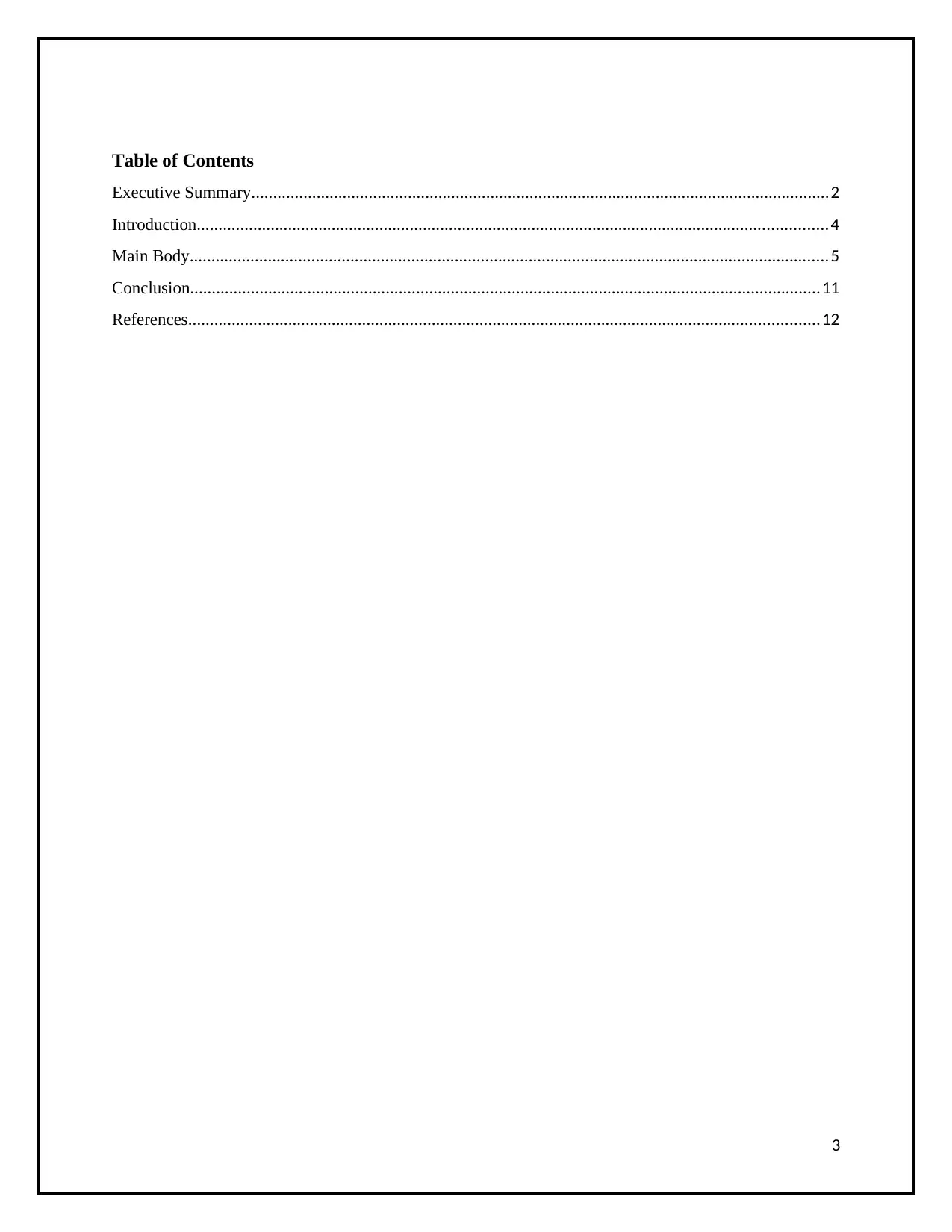
Table of Contents
Executive Summary.....................................................................................................................................2
Introduction.................................................................................................................................................4
Main Body...................................................................................................................................................5
Conclusion.................................................................................................................................................11
References.................................................................................................................................................12
3
Executive Summary.....................................................................................................................................2
Introduction.................................................................................................................................................4
Main Body...................................................................................................................................................5
Conclusion.................................................................................................................................................11
References.................................................................................................................................................12
3
⊘ This is a preview!⊘
Do you want full access?
Subscribe today to unlock all pages.

Trusted by 1+ million students worldwide
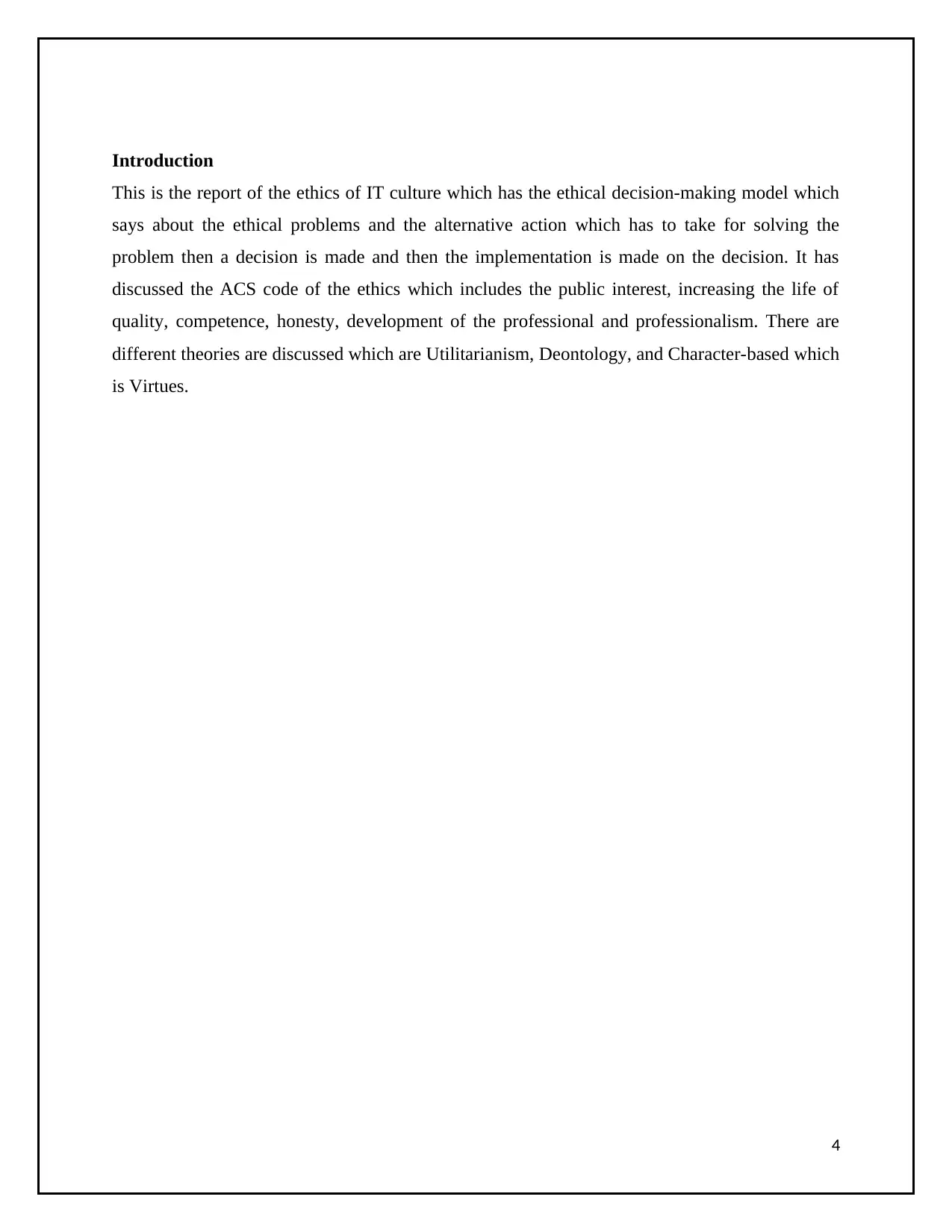
Introduction
This is the report of the ethics of IT culture which has the ethical decision-making model which
says about the ethical problems and the alternative action which has to take for solving the
problem then a decision is made and then the implementation is made on the decision. It has
discussed the ACS code of the ethics which includes the public interest, increasing the life of
quality, competence, honesty, development of the professional and professionalism. There are
different theories are discussed which are Utilitarianism, Deontology, and Character-based which
is Virtues.
4
This is the report of the ethics of IT culture which has the ethical decision-making model which
says about the ethical problems and the alternative action which has to take for solving the
problem then a decision is made and then the implementation is made on the decision. It has
discussed the ACS code of the ethics which includes the public interest, increasing the life of
quality, competence, honesty, development of the professional and professionalism. There are
different theories are discussed which are Utilitarianism, Deontology, and Character-based which
is Virtues.
4
Paraphrase This Document
Need a fresh take? Get an instant paraphrase of this document with our AI Paraphraser
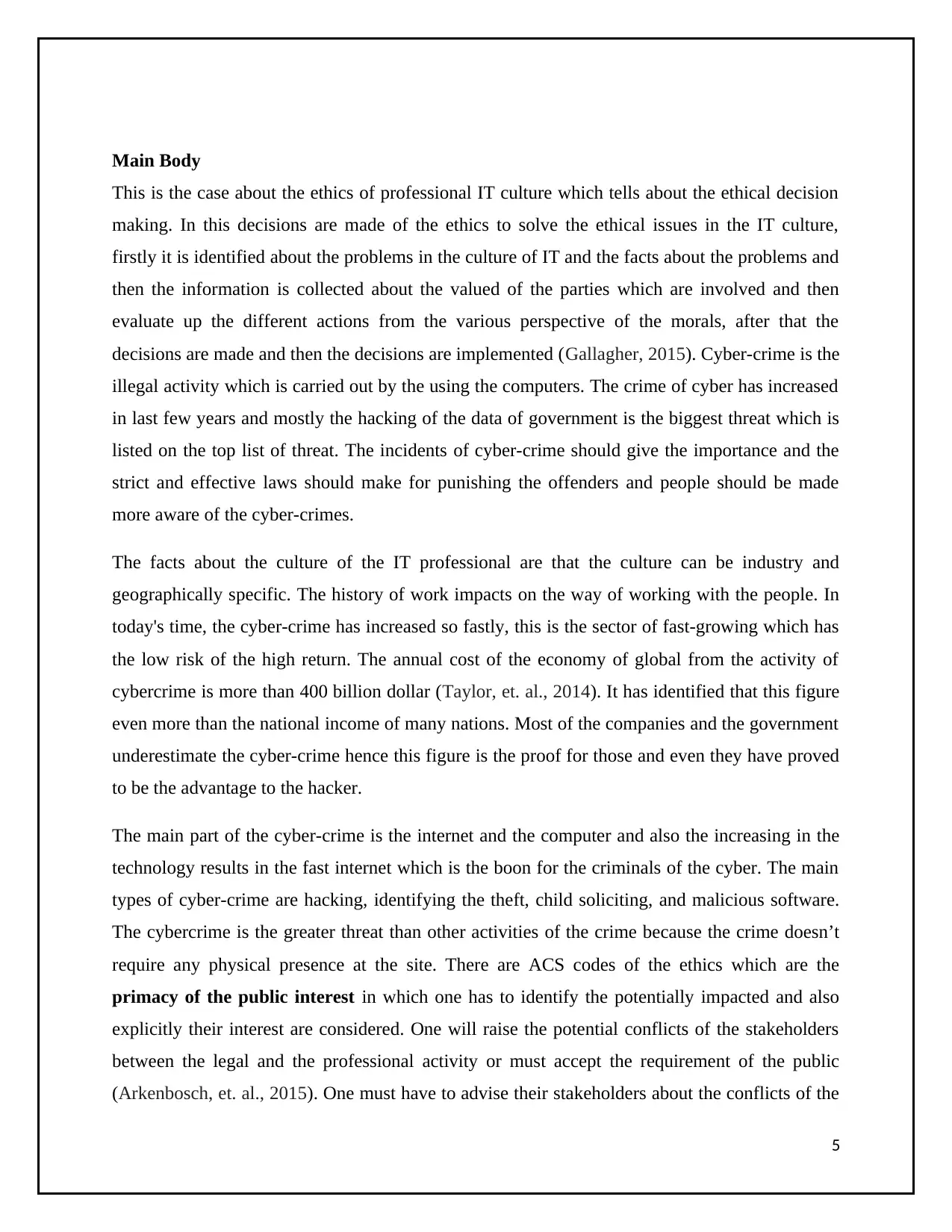
Main Body
This is the case about the ethics of professional IT culture which tells about the ethical decision
making. In this decisions are made of the ethics to solve the ethical issues in the IT culture,
firstly it is identified about the problems in the culture of IT and the facts about the problems and
then the information is collected about the valued of the parties which are involved and then
evaluate up the different actions from the various perspective of the morals, after that the
decisions are made and then the decisions are implemented (Gallagher, 2015). Cyber-crime is the
illegal activity which is carried out by the using the computers. The crime of cyber has increased
in last few years and mostly the hacking of the data of government is the biggest threat which is
listed on the top list of threat. The incidents of cyber-crime should give the importance and the
strict and effective laws should make for punishing the offenders and people should be made
more aware of the cyber-crimes.
The facts about the culture of the IT professional are that the culture can be industry and
geographically specific. The history of work impacts on the way of working with the people. In
today's time, the cyber-crime has increased so fastly, this is the sector of fast-growing which has
the low risk of the high return. The annual cost of the economy of global from the activity of
cybercrime is more than 400 billion dollar (Taylor, et. al., 2014). It has identified that this figure
even more than the national income of many nations. Most of the companies and the government
underestimate the cyber-crime hence this figure is the proof for those and even they have proved
to be the advantage to the hacker.
The main part of the cyber-crime is the internet and the computer and also the increasing in the
technology results in the fast internet which is the boon for the criminals of the cyber. The main
types of cyber-crime are hacking, identifying the theft, child soliciting, and malicious software.
The cybercrime is the greater threat than other activities of the crime because the crime doesn’t
require any physical presence at the site. There are ACS codes of the ethics which are the
primacy of the public interest in which one has to identify the potentially impacted and also
explicitly their interest are considered. One will raise the potential conflicts of the stakeholders
between the legal and the professional activity or must accept the requirement of the public
(Arkenbosch, et. al., 2015). One must have to advise their stakeholders about the conflicts of the
5
This is the case about the ethics of professional IT culture which tells about the ethical decision
making. In this decisions are made of the ethics to solve the ethical issues in the IT culture,
firstly it is identified about the problems in the culture of IT and the facts about the problems and
then the information is collected about the valued of the parties which are involved and then
evaluate up the different actions from the various perspective of the morals, after that the
decisions are made and then the decisions are implemented (Gallagher, 2015). Cyber-crime is the
illegal activity which is carried out by the using the computers. The crime of cyber has increased
in last few years and mostly the hacking of the data of government is the biggest threat which is
listed on the top list of threat. The incidents of cyber-crime should give the importance and the
strict and effective laws should make for punishing the offenders and people should be made
more aware of the cyber-crimes.
The facts about the culture of the IT professional are that the culture can be industry and
geographically specific. The history of work impacts on the way of working with the people. In
today's time, the cyber-crime has increased so fastly, this is the sector of fast-growing which has
the low risk of the high return. The annual cost of the economy of global from the activity of
cybercrime is more than 400 billion dollar (Taylor, et. al., 2014). It has identified that this figure
even more than the national income of many nations. Most of the companies and the government
underestimate the cyber-crime hence this figure is the proof for those and even they have proved
to be the advantage to the hacker.
The main part of the cyber-crime is the internet and the computer and also the increasing in the
technology results in the fast internet which is the boon for the criminals of the cyber. The main
types of cyber-crime are hacking, identifying the theft, child soliciting, and malicious software.
The cybercrime is the greater threat than other activities of the crime because the crime doesn’t
require any physical presence at the site. There are ACS codes of the ethics which are the
primacy of the public interest in which one has to identify the potentially impacted and also
explicitly their interest are considered. One will raise the potential conflicts of the stakeholders
between the legal and the professional activity or must accept the requirement of the public
(Arkenbosch, et. al., 2015). One must have to advise their stakeholders about the conflicts of the
5
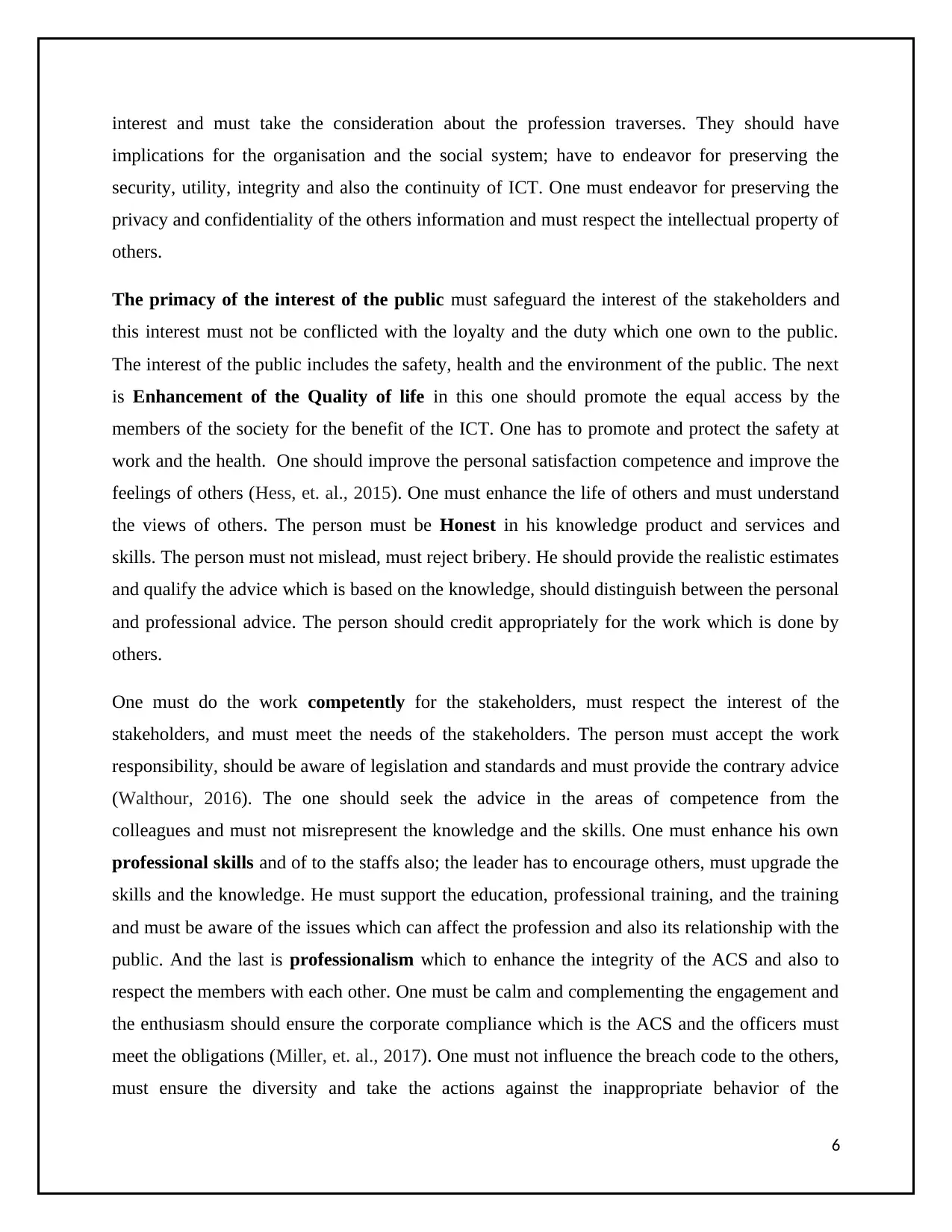
interest and must take the consideration about the profession traverses. They should have
implications for the organisation and the social system; have to endeavor for preserving the
security, utility, integrity and also the continuity of ICT. One must endeavor for preserving the
privacy and confidentiality of the others information and must respect the intellectual property of
others.
The primacy of the interest of the public must safeguard the interest of the stakeholders and
this interest must not be conflicted with the loyalty and the duty which one own to the public.
The interest of the public includes the safety, health and the environment of the public. The next
is Enhancement of the Quality of life in this one should promote the equal access by the
members of the society for the benefit of the ICT. One has to promote and protect the safety at
work and the health. One should improve the personal satisfaction competence and improve the
feelings of others (Hess, et. al., 2015). One must enhance the life of others and must understand
the views of others. The person must be Honest in his knowledge product and services and
skills. The person must not mislead, must reject bribery. He should provide the realistic estimates
and qualify the advice which is based on the knowledge, should distinguish between the personal
and professional advice. The person should credit appropriately for the work which is done by
others.
One must do the work competently for the stakeholders, must respect the interest of the
stakeholders, and must meet the needs of the stakeholders. The person must accept the work
responsibility, should be aware of legislation and standards and must provide the contrary advice
(Walthour, 2016). The one should seek the advice in the areas of competence from the
colleagues and must not misrepresent the knowledge and the skills. One must enhance his own
professional skills and of to the staffs also; the leader has to encourage others, must upgrade the
skills and the knowledge. He must support the education, professional training, and the training
and must be aware of the issues which can affect the profession and also its relationship with the
public. And the last is professionalism which to enhance the integrity of the ACS and also to
respect the members with each other. One must be calm and complementing the engagement and
the enthusiasm should ensure the corporate compliance which is the ACS and the officers must
meet the obligations (Miller, et. al., 2017). One must not influence the breach code to the others,
must ensure the diversity and take the actions against the inappropriate behavior of the
6
implications for the organisation and the social system; have to endeavor for preserving the
security, utility, integrity and also the continuity of ICT. One must endeavor for preserving the
privacy and confidentiality of the others information and must respect the intellectual property of
others.
The primacy of the interest of the public must safeguard the interest of the stakeholders and
this interest must not be conflicted with the loyalty and the duty which one own to the public.
The interest of the public includes the safety, health and the environment of the public. The next
is Enhancement of the Quality of life in this one should promote the equal access by the
members of the society for the benefit of the ICT. One has to promote and protect the safety at
work and the health. One should improve the personal satisfaction competence and improve the
feelings of others (Hess, et. al., 2015). One must enhance the life of others and must understand
the views of others. The person must be Honest in his knowledge product and services and
skills. The person must not mislead, must reject bribery. He should provide the realistic estimates
and qualify the advice which is based on the knowledge, should distinguish between the personal
and professional advice. The person should credit appropriately for the work which is done by
others.
One must do the work competently for the stakeholders, must respect the interest of the
stakeholders, and must meet the needs of the stakeholders. The person must accept the work
responsibility, should be aware of legislation and standards and must provide the contrary advice
(Walthour, 2016). The one should seek the advice in the areas of competence from the
colleagues and must not misrepresent the knowledge and the skills. One must enhance his own
professional skills and of to the staffs also; the leader has to encourage others, must upgrade the
skills and the knowledge. He must support the education, professional training, and the training
and must be aware of the issues which can affect the profession and also its relationship with the
public. And the last is professionalism which to enhance the integrity of the ACS and also to
respect the members with each other. One must be calm and complementing the engagement and
the enthusiasm should ensure the corporate compliance which is the ACS and the officers must
meet the obligations (Miller, et. al., 2017). One must not influence the breach code to the others,
must ensure the diversity and take the actions against the inappropriate behavior of the
6
⊘ This is a preview!⊘
Do you want full access?
Subscribe today to unlock all pages.

Trusted by 1+ million students worldwide
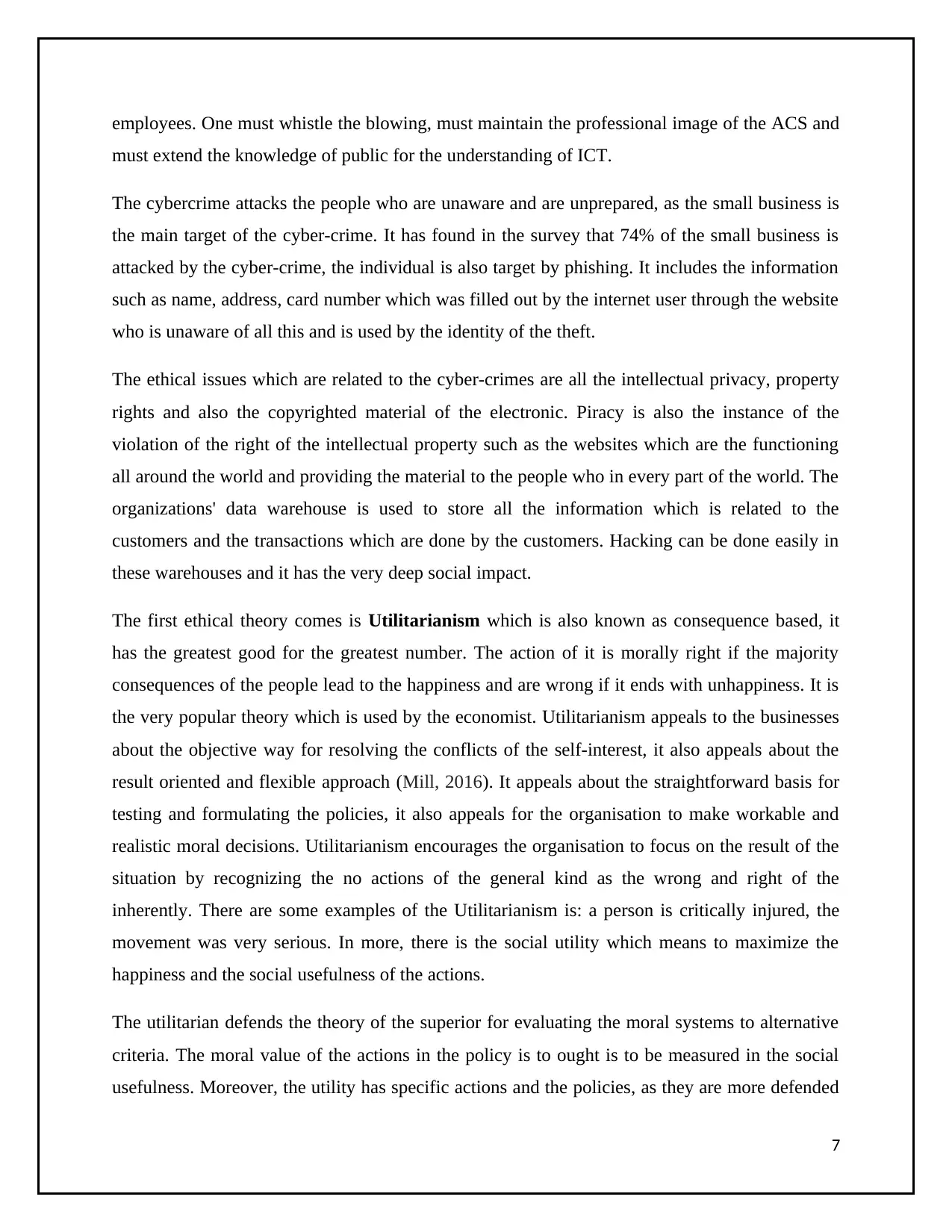
employees. One must whistle the blowing, must maintain the professional image of the ACS and
must extend the knowledge of public for the understanding of ICT.
The cybercrime attacks the people who are unaware and are unprepared, as the small business is
the main target of the cyber-crime. It has found in the survey that 74% of the small business is
attacked by the cyber-crime, the individual is also target by phishing. It includes the information
such as name, address, card number which was filled out by the internet user through the website
who is unaware of all this and is used by the identity of the theft.
The ethical issues which are related to the cyber-crimes are all the intellectual privacy, property
rights and also the copyrighted material of the electronic. Piracy is also the instance of the
violation of the right of the intellectual property such as the websites which are the functioning
all around the world and providing the material to the people who in every part of the world. The
organizations' data warehouse is used to store all the information which is related to the
customers and the transactions which are done by the customers. Hacking can be done easily in
these warehouses and it has the very deep social impact.
The first ethical theory comes is Utilitarianism which is also known as consequence based, it
has the greatest good for the greatest number. The action of it is morally right if the majority
consequences of the people lead to the happiness and are wrong if it ends with unhappiness. It is
the very popular theory which is used by the economist. Utilitarianism appeals to the businesses
about the objective way for resolving the conflicts of the self-interest, it also appeals about the
result oriented and flexible approach (Mill, 2016). It appeals about the straightforward basis for
testing and formulating the policies, it also appeals for the organisation to make workable and
realistic moral decisions. Utilitarianism encourages the organisation to focus on the result of the
situation by recognizing the no actions of the general kind as the wrong and right of the
inherently. There are some examples of the Utilitarianism is: a person is critically injured, the
movement was very serious. In more, there is the social utility which means to maximize the
happiness and the social usefulness of the actions.
The utilitarian defends the theory of the superior for evaluating the moral systems to alternative
criteria. The moral value of the actions in the policy is to ought is to be measured in the social
usefulness. Moreover, the utility has specific actions and the policies, as they are more defended
7
must extend the knowledge of public for the understanding of ICT.
The cybercrime attacks the people who are unaware and are unprepared, as the small business is
the main target of the cyber-crime. It has found in the survey that 74% of the small business is
attacked by the cyber-crime, the individual is also target by phishing. It includes the information
such as name, address, card number which was filled out by the internet user through the website
who is unaware of all this and is used by the identity of the theft.
The ethical issues which are related to the cyber-crimes are all the intellectual privacy, property
rights and also the copyrighted material of the electronic. Piracy is also the instance of the
violation of the right of the intellectual property such as the websites which are the functioning
all around the world and providing the material to the people who in every part of the world. The
organizations' data warehouse is used to store all the information which is related to the
customers and the transactions which are done by the customers. Hacking can be done easily in
these warehouses and it has the very deep social impact.
The first ethical theory comes is Utilitarianism which is also known as consequence based, it
has the greatest good for the greatest number. The action of it is morally right if the majority
consequences of the people lead to the happiness and are wrong if it ends with unhappiness. It is
the very popular theory which is used by the economist. Utilitarianism appeals to the businesses
about the objective way for resolving the conflicts of the self-interest, it also appeals about the
result oriented and flexible approach (Mill, 2016). It appeals about the straightforward basis for
testing and formulating the policies, it also appeals for the organisation to make workable and
realistic moral decisions. Utilitarianism encourages the organisation to focus on the result of the
situation by recognizing the no actions of the general kind as the wrong and right of the
inherently. There are some examples of the Utilitarianism is: a person is critically injured, the
movement was very serious. In more, there is the social utility which means to maximize the
happiness and the social usefulness of the actions.
The utilitarian defends the theory of the superior for evaluating the moral systems to alternative
criteria. The moral value of the actions in the policy is to ought is to be measured in the social
usefulness. Moreover, the utility has specific actions and the policies, as they are more defended
7
Paraphrase This Document
Need a fresh take? Get an instant paraphrase of this document with our AI Paraphraser
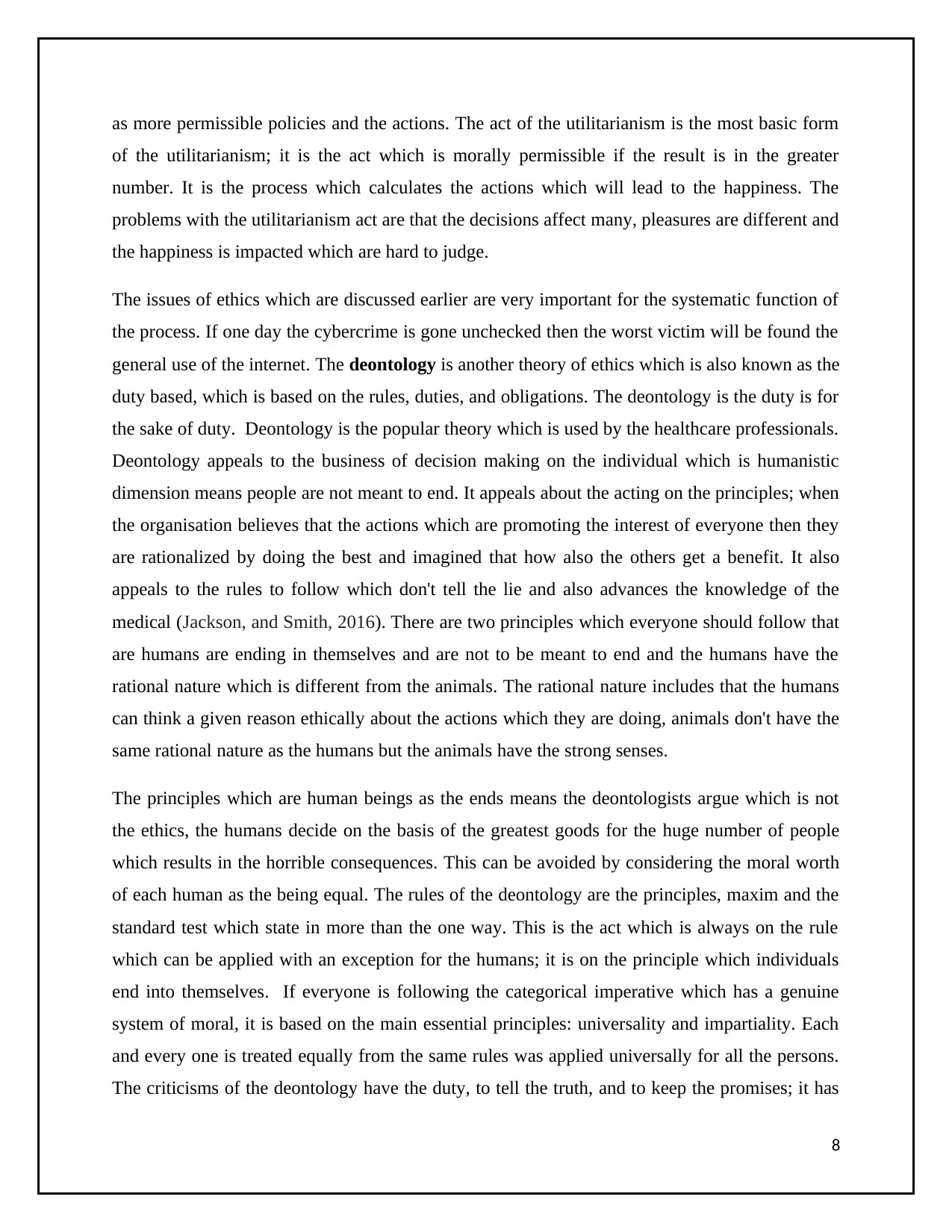
as more permissible policies and the actions. The act of the utilitarianism is the most basic form
of the utilitarianism; it is the act which is morally permissible if the result is in the greater
number. It is the process which calculates the actions which will lead to the happiness. The
problems with the utilitarianism act are that the decisions affect many, pleasures are different and
the happiness is impacted which are hard to judge.
The issues of ethics which are discussed earlier are very important for the systematic function of
the process. If one day the cybercrime is gone unchecked then the worst victim will be found the
general use of the internet. The deontology is another theory of ethics which is also known as the
duty based, which is based on the rules, duties, and obligations. The deontology is the duty is for
the sake of duty. Deontology is the popular theory which is used by the healthcare professionals.
Deontology appeals to the business of decision making on the individual which is humanistic
dimension means people are not meant to end. It appeals about the acting on the principles; when
the organisation believes that the actions which are promoting the interest of everyone then they
are rationalized by doing the best and imagined that how also the others get a benefit. It also
appeals to the rules to follow which don't tell the lie and also advances the knowledge of the
medical (Jackson, and Smith, 2016). There are two principles which everyone should follow that
are humans are ending in themselves and are not to be meant to end and the humans have the
rational nature which is different from the animals. The rational nature includes that the humans
can think a given reason ethically about the actions which they are doing, animals don't have the
same rational nature as the humans but the animals have the strong senses.
The principles which are human beings as the ends means the deontologists argue which is not
the ethics, the humans decide on the basis of the greatest goods for the huge number of people
which results in the horrible consequences. This can be avoided by considering the moral worth
of each human as the being equal. The rules of the deontology are the principles, maxim and the
standard test which state in more than the one way. This is the act which is always on the rule
which can be applied with an exception for the humans; it is on the principle which individuals
end into themselves. If everyone is following the categorical imperative which has a genuine
system of moral, it is based on the main essential principles: universality and impartiality. Each
and every one is treated equally from the same rules was applied universally for all the persons.
The criticisms of the deontology have the duty, to tell the truth, and to keep the promises; it has
8
of the utilitarianism; it is the act which is morally permissible if the result is in the greater
number. It is the process which calculates the actions which will lead to the happiness. The
problems with the utilitarianism act are that the decisions affect many, pleasures are different and
the happiness is impacted which are hard to judge.
The issues of ethics which are discussed earlier are very important for the systematic function of
the process. If one day the cybercrime is gone unchecked then the worst victim will be found the
general use of the internet. The deontology is another theory of ethics which is also known as the
duty based, which is based on the rules, duties, and obligations. The deontology is the duty is for
the sake of duty. Deontology is the popular theory which is used by the healthcare professionals.
Deontology appeals to the business of decision making on the individual which is humanistic
dimension means people are not meant to end. It appeals about the acting on the principles; when
the organisation believes that the actions which are promoting the interest of everyone then they
are rationalized by doing the best and imagined that how also the others get a benefit. It also
appeals to the rules to follow which don't tell the lie and also advances the knowledge of the
medical (Jackson, and Smith, 2016). There are two principles which everyone should follow that
are humans are ending in themselves and are not to be meant to end and the humans have the
rational nature which is different from the animals. The rational nature includes that the humans
can think a given reason ethically about the actions which they are doing, animals don't have the
same rational nature as the humans but the animals have the strong senses.
The principles which are human beings as the ends means the deontologists argue which is not
the ethics, the humans decide on the basis of the greatest goods for the huge number of people
which results in the horrible consequences. This can be avoided by considering the moral worth
of each human as the being equal. The rules of the deontology are the principles, maxim and the
standard test which state in more than the one way. This is the act which is always on the rule
which can be applied with an exception for the humans; it is on the principle which individuals
end into themselves. If everyone is following the categorical imperative which has a genuine
system of moral, it is based on the main essential principles: universality and impartiality. Each
and every one is treated equally from the same rules was applied universally for all the persons.
The criticisms of the deontology have the duty, to tell the truth, and to keep the promises; it has
8
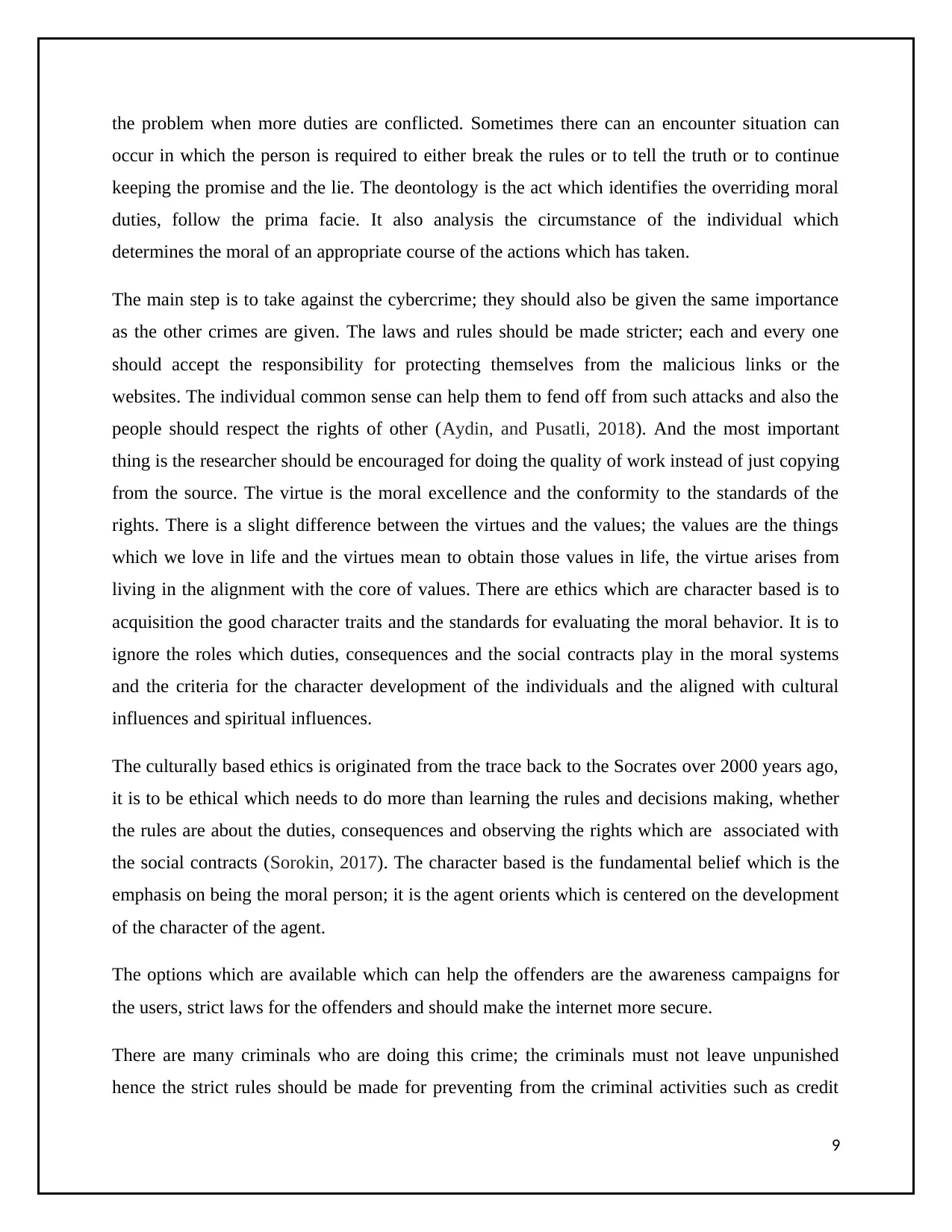
the problem when more duties are conflicted. Sometimes there can an encounter situation can
occur in which the person is required to either break the rules or to tell the truth or to continue
keeping the promise and the lie. The deontology is the act which identifies the overriding moral
duties, follow the prima facie. It also analysis the circumstance of the individual which
determines the moral of an appropriate course of the actions which has taken.
The main step is to take against the cybercrime; they should also be given the same importance
as the other crimes are given. The laws and rules should be made stricter; each and every one
should accept the responsibility for protecting themselves from the malicious links or the
websites. The individual common sense can help them to fend off from such attacks and also the
people should respect the rights of other (Aydin, and Pusatli, 2018). And the most important
thing is the researcher should be encouraged for doing the quality of work instead of just copying
from the source. The virtue is the moral excellence and the conformity to the standards of the
rights. There is a slight difference between the virtues and the values; the values are the things
which we love in life and the virtues mean to obtain those values in life, the virtue arises from
living in the alignment with the core of values. There are ethics which are character based is to
acquisition the good character traits and the standards for evaluating the moral behavior. It is to
ignore the roles which duties, consequences and the social contracts play in the moral systems
and the criteria for the character development of the individuals and the aligned with cultural
influences and spiritual influences.
The culturally based ethics is originated from the trace back to the Socrates over 2000 years ago,
it is to be ethical which needs to do more than learning the rules and decisions making, whether
the rules are about the duties, consequences and observing the rights which are associated with
the social contracts (Sorokin, 2017). The character based is the fundamental belief which is the
emphasis on being the moral person; it is the agent orients which is centered on the development
of the character of the agent.
The options which are available which can help the offenders are the awareness campaigns for
the users, strict laws for the offenders and should make the internet more secure.
There are many criminals who are doing this crime; the criminals must not leave unpunished
hence the strict rules should be made for preventing from the criminal activities such as credit
9
occur in which the person is required to either break the rules or to tell the truth or to continue
keeping the promise and the lie. The deontology is the act which identifies the overriding moral
duties, follow the prima facie. It also analysis the circumstance of the individual which
determines the moral of an appropriate course of the actions which has taken.
The main step is to take against the cybercrime; they should also be given the same importance
as the other crimes are given. The laws and rules should be made stricter; each and every one
should accept the responsibility for protecting themselves from the malicious links or the
websites. The individual common sense can help them to fend off from such attacks and also the
people should respect the rights of other (Aydin, and Pusatli, 2018). And the most important
thing is the researcher should be encouraged for doing the quality of work instead of just copying
from the source. The virtue is the moral excellence and the conformity to the standards of the
rights. There is a slight difference between the virtues and the values; the values are the things
which we love in life and the virtues mean to obtain those values in life, the virtue arises from
living in the alignment with the core of values. There are ethics which are character based is to
acquisition the good character traits and the standards for evaluating the moral behavior. It is to
ignore the roles which duties, consequences and the social contracts play in the moral systems
and the criteria for the character development of the individuals and the aligned with cultural
influences and spiritual influences.
The culturally based ethics is originated from the trace back to the Socrates over 2000 years ago,
it is to be ethical which needs to do more than learning the rules and decisions making, whether
the rules are about the duties, consequences and observing the rights which are associated with
the social contracts (Sorokin, 2017). The character based is the fundamental belief which is the
emphasis on being the moral person; it is the agent orients which is centered on the development
of the character of the agent.
The options which are available which can help the offenders are the awareness campaigns for
the users, strict laws for the offenders and should make the internet more secure.
There are many criminals who are doing this crime; the criminals must not leave unpunished
hence the strict rules should be made for preventing from the criminal activities such as credit
9
⊘ This is a preview!⊘
Do you want full access?
Subscribe today to unlock all pages.

Trusted by 1+ million students worldwide
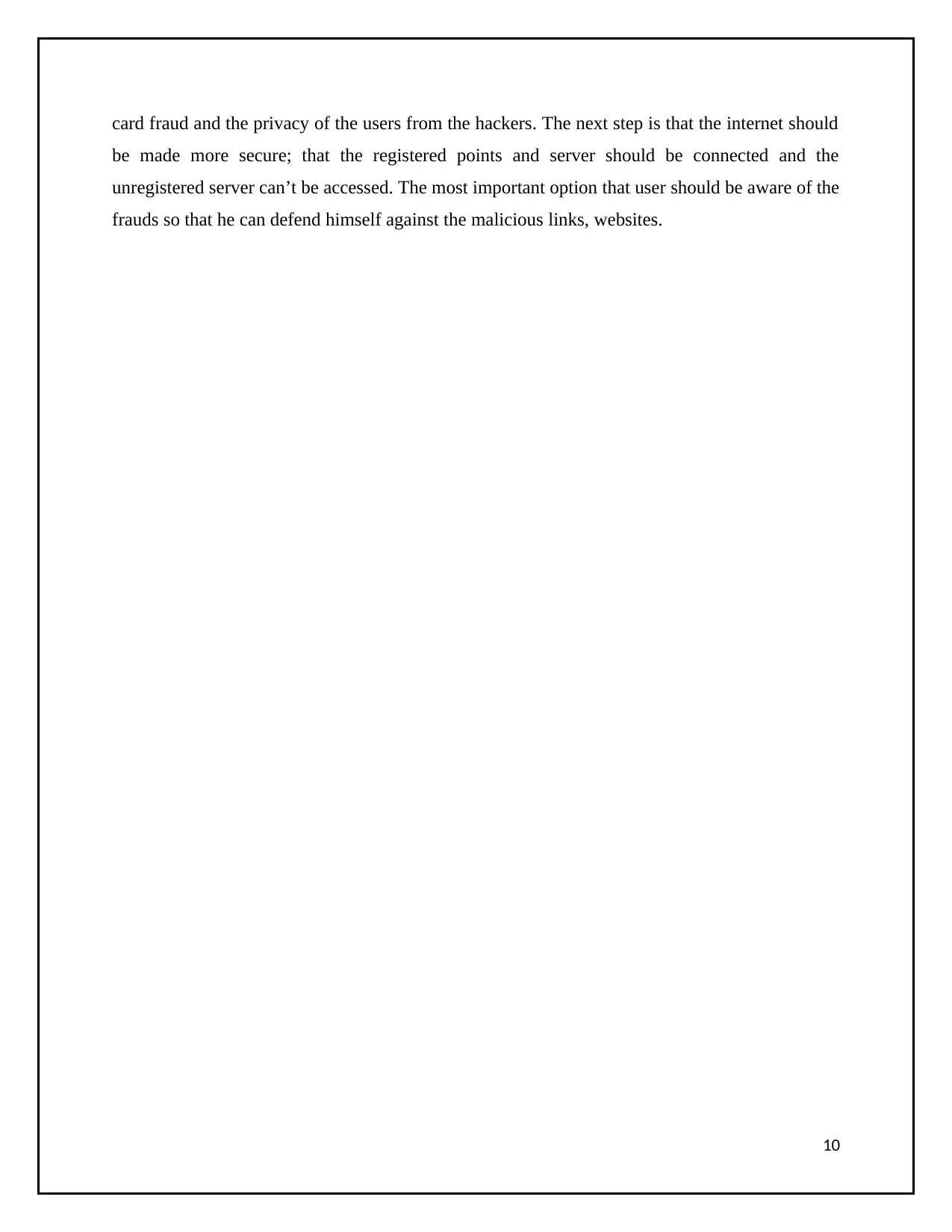
card fraud and the privacy of the users from the hackers. The next step is that the internet should
be made more secure; that the registered points and server should be connected and the
unregistered server can’t be accessed. The most important option that user should be aware of the
frauds so that he can defend himself against the malicious links, websites.
10
be made more secure; that the registered points and server should be connected and the
unregistered server can’t be accessed. The most important option that user should be aware of the
frauds so that he can defend himself against the malicious links, websites.
10
Paraphrase This Document
Need a fresh take? Get an instant paraphrase of this document with our AI Paraphraser
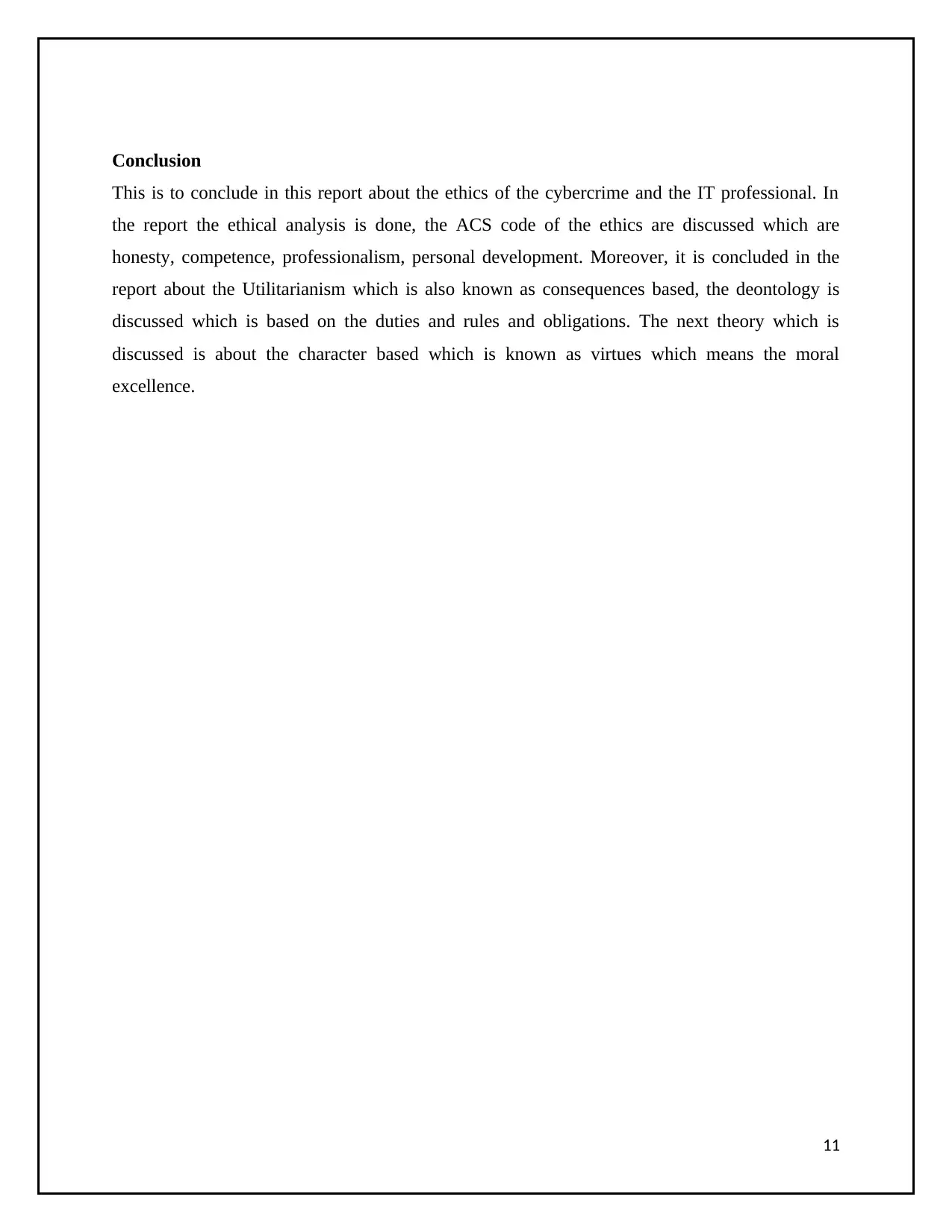
Conclusion
This is to conclude in this report about the ethics of the cybercrime and the IT professional. In
the report the ethical analysis is done, the ACS code of the ethics are discussed which are
honesty, competence, professionalism, personal development. Moreover, it is concluded in the
report about the Utilitarianism which is also known as consequences based, the deontology is
discussed which is based on the duties and rules and obligations. The next theory which is
discussed is about the character based which is known as virtues which means the moral
excellence.
11
This is to conclude in this report about the ethics of the cybercrime and the IT professional. In
the report the ethical analysis is done, the ACS code of the ethics are discussed which are
honesty, competence, professionalism, personal development. Moreover, it is concluded in the
report about the Utilitarianism which is also known as consequences based, the deontology is
discussed which is based on the duties and rules and obligations. The next theory which is
discussed is about the character based which is known as virtues which means the moral
excellence.
11
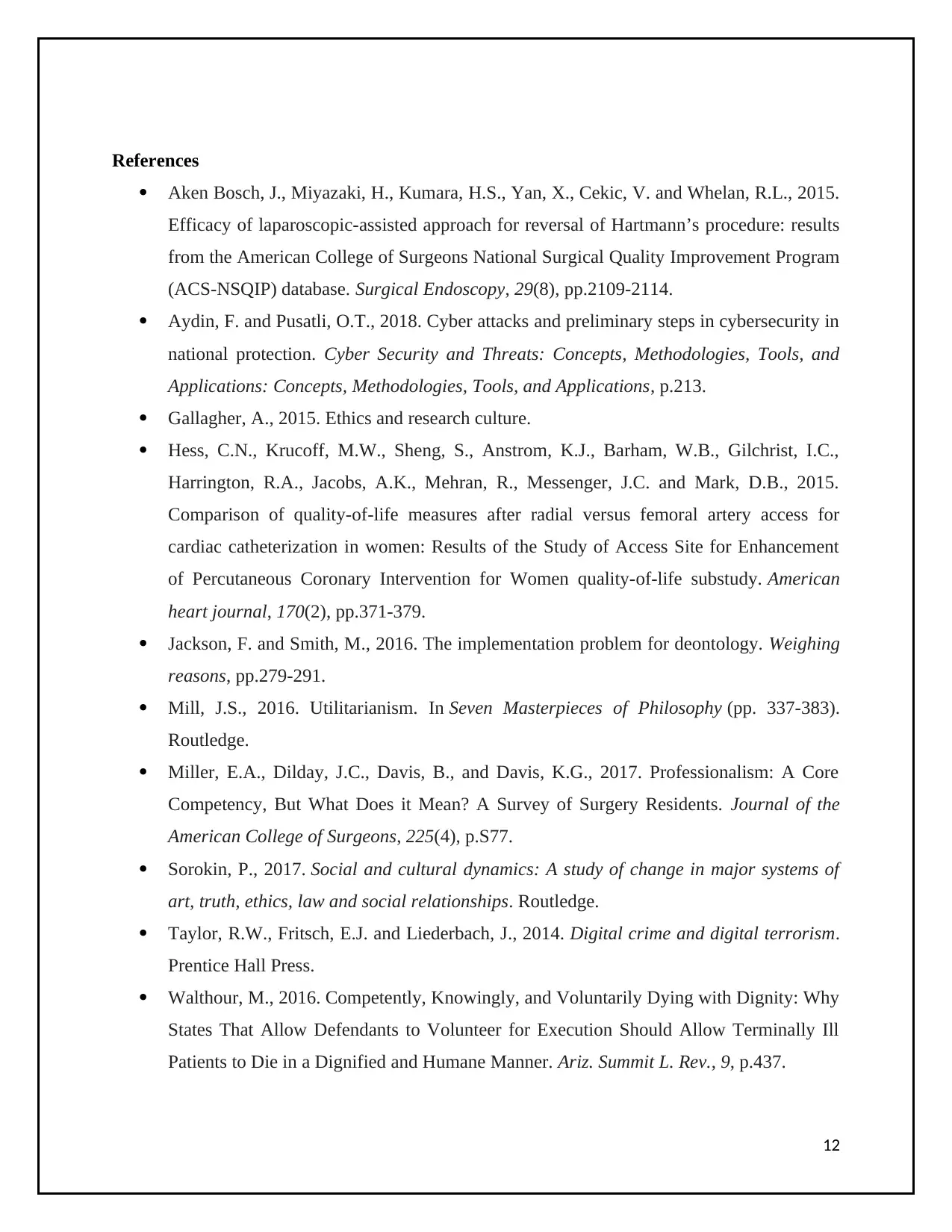
References
Aken Bosch, J., Miyazaki, H., Kumara, H.S., Yan, X., Cekic, V. and Whelan, R.L., 2015.
Efficacy of laparoscopic-assisted approach for reversal of Hartmann’s procedure: results
from the American College of Surgeons National Surgical Quality Improvement Program
(ACS-NSQIP) database. Surgical Endoscopy, 29(8), pp.2109-2114.
Aydin, F. and Pusatli, O.T., 2018. Cyber attacks and preliminary steps in cybersecurity in
national protection. Cyber Security and Threats: Concepts, Methodologies, Tools, and
Applications: Concepts, Methodologies, Tools, and Applications, p.213.
Gallagher, A., 2015. Ethics and research culture.
Hess, C.N., Krucoff, M.W., Sheng, S., Anstrom, K.J., Barham, W.B., Gilchrist, I.C.,
Harrington, R.A., Jacobs, A.K., Mehran, R., Messenger, J.C. and Mark, D.B., 2015.
Comparison of quality-of-life measures after radial versus femoral artery access for
cardiac catheterization in women: Results of the Study of Access Site for Enhancement
of Percutaneous Coronary Intervention for Women quality-of-life substudy. American
heart journal, 170(2), pp.371-379.
Jackson, F. and Smith, M., 2016. The implementation problem for deontology. Weighing
reasons, pp.279-291.
Mill, J.S., 2016. Utilitarianism. In Seven Masterpieces of Philosophy (pp. 337-383).
Routledge.
Miller, E.A., Dilday, J.C., Davis, B., and Davis, K.G., 2017. Professionalism: A Core
Competency, But What Does it Mean? A Survey of Surgery Residents. Journal of the
American College of Surgeons, 225(4), p.S77.
Sorokin, P., 2017. Social and cultural dynamics: A study of change in major systems of
art, truth, ethics, law and social relationships. Routledge.
Taylor, R.W., Fritsch, E.J. and Liederbach, J., 2014. Digital crime and digital terrorism.
Prentice Hall Press.
Walthour, M., 2016. Competently, Knowingly, and Voluntarily Dying with Dignity: Why
States That Allow Defendants to Volunteer for Execution Should Allow Terminally Ill
Patients to Die in a Dignified and Humane Manner. Ariz. Summit L. Rev., 9, p.437.
12
Aken Bosch, J., Miyazaki, H., Kumara, H.S., Yan, X., Cekic, V. and Whelan, R.L., 2015.
Efficacy of laparoscopic-assisted approach for reversal of Hartmann’s procedure: results
from the American College of Surgeons National Surgical Quality Improvement Program
(ACS-NSQIP) database. Surgical Endoscopy, 29(8), pp.2109-2114.
Aydin, F. and Pusatli, O.T., 2018. Cyber attacks and preliminary steps in cybersecurity in
national protection. Cyber Security and Threats: Concepts, Methodologies, Tools, and
Applications: Concepts, Methodologies, Tools, and Applications, p.213.
Gallagher, A., 2015. Ethics and research culture.
Hess, C.N., Krucoff, M.W., Sheng, S., Anstrom, K.J., Barham, W.B., Gilchrist, I.C.,
Harrington, R.A., Jacobs, A.K., Mehran, R., Messenger, J.C. and Mark, D.B., 2015.
Comparison of quality-of-life measures after radial versus femoral artery access for
cardiac catheterization in women: Results of the Study of Access Site for Enhancement
of Percutaneous Coronary Intervention for Women quality-of-life substudy. American
heart journal, 170(2), pp.371-379.
Jackson, F. and Smith, M., 2016. The implementation problem for deontology. Weighing
reasons, pp.279-291.
Mill, J.S., 2016. Utilitarianism. In Seven Masterpieces of Philosophy (pp. 337-383).
Routledge.
Miller, E.A., Dilday, J.C., Davis, B., and Davis, K.G., 2017. Professionalism: A Core
Competency, But What Does it Mean? A Survey of Surgery Residents. Journal of the
American College of Surgeons, 225(4), p.S77.
Sorokin, P., 2017. Social and cultural dynamics: A study of change in major systems of
art, truth, ethics, law and social relationships. Routledge.
Taylor, R.W., Fritsch, E.J. and Liederbach, J., 2014. Digital crime and digital terrorism.
Prentice Hall Press.
Walthour, M., 2016. Competently, Knowingly, and Voluntarily Dying with Dignity: Why
States That Allow Defendants to Volunteer for Execution Should Allow Terminally Ill
Patients to Die in a Dignified and Humane Manner. Ariz. Summit L. Rev., 9, p.437.
12
⊘ This is a preview!⊘
Do you want full access?
Subscribe today to unlock all pages.

Trusted by 1+ million students worldwide
1 out of 12
Related Documents
Your All-in-One AI-Powered Toolkit for Academic Success.
+13062052269
info@desklib.com
Available 24*7 on WhatsApp / Email
![[object Object]](/_next/static/media/star-bottom.7253800d.svg)
Unlock your academic potential
Copyright © 2020–2026 A2Z Services. All Rights Reserved. Developed and managed by ZUCOL.





